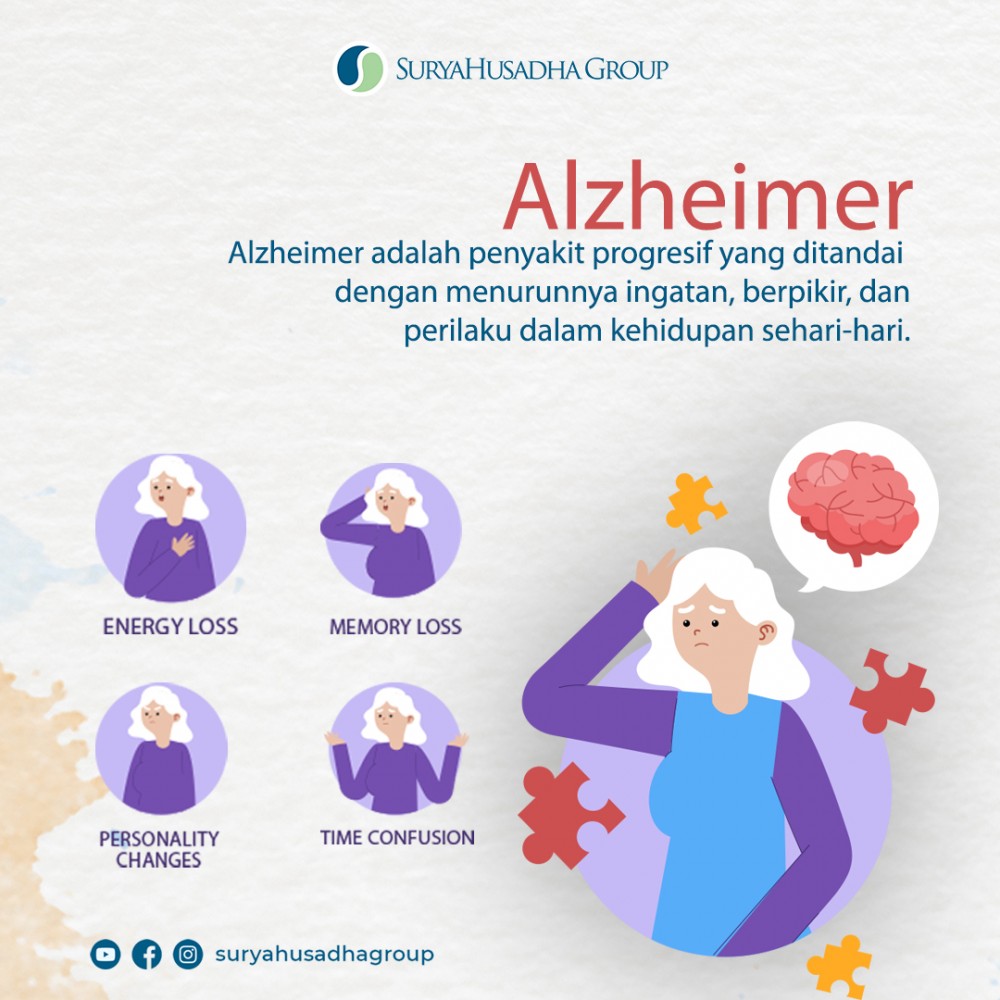Alzheimer's is a progressive disease characterized by decreased memory, thinking, and behavior in everyday life. Although it develops slowly, this disease can damage brain tissue over time. In fact, in some cases it can lead to death due to complications.
Many people think that this disease is the same as dementia. It should be noted that the two are related, but they are different things. The difference between Alzheimer's and dementia is that Alzheimer's is one of the most common types of dementia. Dementia is a brain disorder that results in the loss of a person's intellectual and social abilities. This disease is classified as a progressive disease that interferes with a person's mental functions, such as memory and behavior.
Symptoms of Alzheimer's disease
1. Dementia
Dementia (forgetfulness) is a typical early symptom of Alzheimer's disease. People with this disease usually have difficulty remembering events or conversations that they have just had. People with
- Alzheimer's disease are very likely to experience the following:
- Often repeating words or sentences and forgetting promises they make.
- Often misplacing items, sometimes putting them in unnatural locations.
- Getting lost in a place he already knows.
- Forgetting the names of family members and objects around him.
- Difficulty finding the right words to identify objects and express thoughts.
2. Difficulty concentrating and making decisions
The next characteristic of Alzheimer's disease is difficulty concentrating, especially on abstract concepts such as numbers.
3. Personality and behavioral changes
Changes in brain tissue cause Alzheimer's patients to experience symptoms that can change their mood and behavior, such as:
- Experiencing depression and indifference to others.
- Withdrawing from various social lives.
- Mood swings and irritability
- Experiencing delusions (disconnection between thoughts, imagination, emotions, and reality).
Alzheimer's Disease Examination
Unfortunately, there is no specific examination to confirm Alzheimer's disease. In general, doctors will assess based on symptoms and also several tests that can help confirm the diagnosis.
- Physical and Neurological Examination
- Mental Status and Neuropsychological Testing
- Laboratory Tests
- Brain Imaging
- Brain Imaging Technology
- Magnetic resonance imaging (MRI). This method uses radio waves and strong magnetic fields to produce detailed images of the brain. MRI is used to rule out other conditions that may cause or increase cognitive symptoms. Not only that, MRI can also be used to assess whether shrinkage in the brain areas involved in Alzheimer's disease has occurred.
- Computerized Tomography (CT). CT scans produce cross-sectional images (slices) of the brain. Currently used mainly to rule out tumors, strokes and head injuries.
- Positron Emission Tomography (PET). During a PET scan, a low-level radioactive tracer is injected into a vein. The tracer is a special form of glucose (sugar) that shows the overall activity in different areas of the brain. This can show which parts of the brain are not functioning properly. New PET techniques are able to detect levels of brain plaque (amyloid) and tangles (tau), two characteristic abnormalities associated with Alzheimer's. However, these new PET techniques are generally found in research settings or in clinical trials.
- Cerebrospinal fluid. In special circumstances such as rapidly progressive dementia or very young onset of dementia, cerebrospinal fluid examination may be performed. The fluid in the spine can be tested for biomarkers that indicate the possibility of Alzheimer's disease.
Treatment for Alzheimer's disease
Medications
Current Alzheimer's medications can help with memory symptoms and other cognitive changes
Creating a Safe and Supportive Environment
Adapting the living situation to the needs of someone with Alzheimer's is an important part of any care plan. For someone with Alzheimer's, establishing and reinforcing routines and minimizing memory-intensive tasks can make life much easier.
Exercise
Regular exercise is important for people with Alzheimer's, as it can improve mood and keep joints, muscles and heart healthy. Exercise can also help improve sleep quality and prevent constipation.
Nutrition
People with Alzheimer's often forget to eat, lose interest in preparing meals or refuse to eat healthy food combinations. They may also forget to drink enough fluids, leading to dehydration and constipation.
sources:
halodoc.com
hellosehat.com
mayoclinic.org
 English
English
 English
English
 Bahasa
Bahasa

English
English
Bahasa




